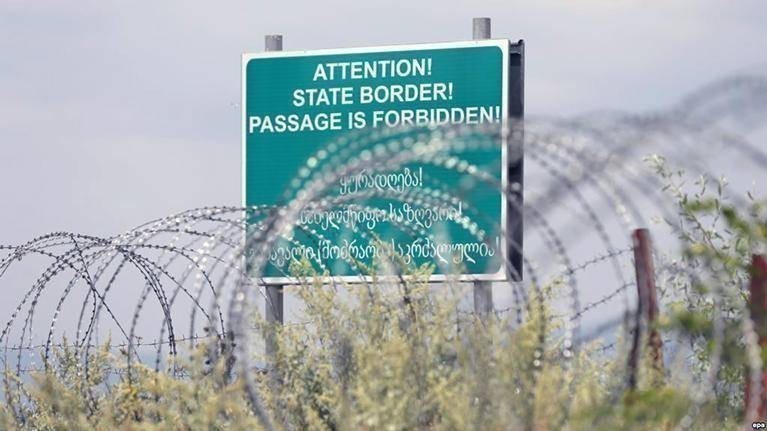საერთო ცხელი ხაზი +995 577 07 05 63


Social Justice Center responds to another case of two Georgian citizens unlawfully imprisoned by the de facto authorities of Abkhazia. Citizens of Georgia, 25-year-old Kristine Talakandze and 29-year-old Asmat Tavadze were illegally detained by the representatives of the de facto authorities of Abkhazia in July and November 2022. They remain in “custody” until now.
Kristine Talakandze lived in the Gali region, and on July 20, 2022, she was arrested while crossing the so-called checkpoint when entering the Georgian-controlled territory. The occupation regime initiated a criminal case on charges of so-called "espionage," and she is "accused" of acting on the instructions of the Georgian Intelligence Service and passing on military and other types of information to the Georgian special services. On May 5, 2023, the so-called court of Abkhazia sentenced her to 10 years and six months in prison.
Asmat Tavadze was arrested by the de facto law enforcement authorities of Abkhazia at her home in Sukhumi, where, according to the so-called security service, 10 grams of narcotic drugs were seized. The facts of Tavadze's arrest show that she had Georgian symbols in her house (the Georgian flag and the coat of arms). As the media revealed, Asmat Tavadze lives in Samtredia, although she has the opportunity to travel to Sukhumi, and in 2021, she also received the so-called citizenship of Abkhazia. Asmat Tavadze is accused of purchasing and storing narcotic drugs, although there is an assumption that her case is given a political dimension.
"Although, according to the authorities, since the day of the arrest of Kristine Takalandze and Asmat Tavadze, they have been actively working for their release, both women have been in custody for the second year, and there is no encouraging information about their transfer to Tbilisi".
In recent years, new trends can be seen in the practice of detention of ethnic Georgians by the de facto authorities. If in previous years, the cases of mass incarceration of ethnic Georgians were mainly connected to charges of the so-called illegal crossing of the border and such cases were usually treated as administrative offenses, recently, the number of criminal arrests, including the number of arrests of women, has increased. In these conditions, when we do not have formats of direct dialogue with the de facto authorities on humanitarian issues, which would give Georgian authorities a more effective opportunity to discuss and negotiate the issues of human security and rights protection, the process of releasing persons arrested under criminal law becomes difficult. The situation is challenging in Abkhazia, where the Incident Prevention and Response Mechanism (IPRM) has not been working since 2018. It should be noted that according to the 2022 report of the State Security Service, nine people continue to be unlawfully imprisoned in both regions of the conflict.
In this regard, it is necessary to consider the harsh conditions in the penitentiary institutions of Abkhazia that have a heavy impact on the security and legal status of the people there. According to a 2017 EU-mandated study by Thomas Hammerberg and Magdalena Grono, Abkhazia's "penitentiary facilities" are in dire physical conditions, so much so that they can cause inmates to suffer health problems, including psychological complications. In addition, according to the 2020 report of the de facto Public Defender of Abkhazia, "penitentiary institutions/places of detention where detained and imprisoned women are housed do not meet their special needs. In 2023, the Office of the De facto Public Defender of Abkhazia published a special report on the current situation in "penitentiary institutions" where it is mentioned that the "penitentiary institutions" built during the Soviet Union do not comply with "national and international standards." In these "facilities," there are not enough beds and rooms, there is no adequate medical service, and people are not given initial medical examinations when transferred to the penitentiary institution. In some institutions, there is no daylight, which seriously affects the psychological condition of the prisoners; there is food only in the facility in Sukhumi; in the rest of the regions, feeding the prisoners depends on the food provided by the family members. the sanitary and hygienic conditions in these facilities are also in a bad state. Without independent international monitoring mechanisms, human rights actors cannot assess and monitor those in custody's legal and physical conditions.
Thus, the health and safety of persons in custody in Abkhazia is critical, and the Georgian authorities need to have systematic approaches and tools to promote the protection of human rights in conflict regions. Among them, it is essential to systematically work with international organizations on the facts of human rights violations in the conflict regions and the ways of their intervention, as well as to create formats of direct dialogue with the de facto authorities on human security, rights, and humanitarian issues in the conditions of protracted conflict.
Considering all the above, Social Justice Center calls on the government,
The website accessibility instruction